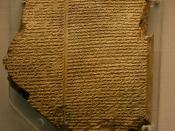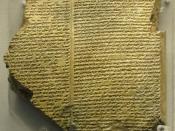Paul Aberion
English 303 West Lit Backgrounds
Professor Beth Haddrell
10/ 20/ 03'
Revision Paper
The Flood Stories: The Validity Debate Continues
In the Epic of Gilgamesh, it articulates how, "For six days and six nights the winds blew, torrent and tempest and flood overwhelmed the world, tempest and flood raged together like warring hosts" (Sandars 111). Alternatively, in the Old Testament, it simply states, "All the fountains of the great deep [were] broken up, and the windows of heaven were opened . . . And the flood was forty days upon the earth; and the waters increased; . . . and the ark went upon the face of the waters."(Holy Bible, Genesis 7:11b, 17a, 18b). In addition, the story of the Flood in Metamorphoses elaborates on the fact that, "Neptune called his river all, and told them, very briefly, to lose their violence, open their houses [...] His trident struck the shuddering earth; it opened the way for the rush of waters" (Humphries 11).
Many critics settle on the work of literature that best explains how, when and why the flood occurred. Would it be justified to classify these poetic writings in terms of accurateness or elaboration?
The three works of written documentation in the Epic of Gilgamesh, The Old Testament, and Metamorphoses detail a flood story with resemblance and dissimilarity. Nevertheless, one work should not be judged by what it is lacking in information in relation to the other works of literature. For example, it is quite clear that the Epic of Gilgamesh and the Book of Metamorphoses is a more elaborated diction of the Flood than in the Old Testament. However, lets not be overly critical towards one version of the flood story due to its lack of intricate detailing to another flood story translation!...


